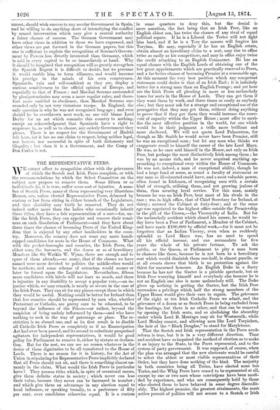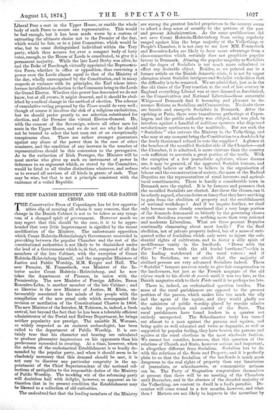THE REPRESENTATIVE PEERS.
WTE cannot affect to sympathise either with the grievances V V of which the Scotch and Irish Peers complain, or with the recommendations by which the Select Committee on the subject now propose to remove them. Some fifteen or so individuals do, it is true, suffer some sort of injustice. A num- ber of Scotch Peers, many of them representing very illustrious Houses, are, unless elected Representative Peers, debarred by custom or law from sitting in either branch of the Legislature, and that disability may fairly be removed. They do not indeed suffer more than the ladies who occasionally inherit these titles, they have a fair representation of a sort—for, un- like the Irish Peers, they can appoint and remove their nomi- nees on each dissolution of Parliament—and they have about three times the chance of becoming Peers of the United King- dom that is enjoyed by any other landholders in the coun- try. Moreover, the country does not want any more handi- capped candidates for seats in the House of Commons. What with the pocket-boroughs and counties, the Irish Peers, the eldest sons, the baronets, and the dozen or so of hereditary Members like Sir Watkin W. Wynn, there are enough and to spare of them already,—so many, that if the classes we have named were more devoted to politics the middle-class would be nowhere, and some scheme of ostracism would sooner or later be forced upon the Legislature. Nevertheless, fifteen more candidates with labels-will not hurt us much, and there is injustice in any disability to accept a popular vote,—an in- justice which, we may remark, is nearly as severe in the case of the Irish Peers. They can sit for any places except those in which they would be useful. Nothing could be better for Ireland than that her counties should be represented by men who, whether Protestant or Catholic, are pretty sure to be educated, to be beyond the influence of the Priests—or rather, beyond the suspicion of being unduly influenced by them—and who have nothing to seek in the way of patronage or place. The re- striction is an absurd one, and as its first result is to disable all Catholic Irish Peers as completely as if no Emancipation Act had ever been passed, and its second to substitute pauperised agitators for independent representatives, it would be good policy for Parliament to remove it, either by statute or declara- tion. But for the rest, we can see no reason whatever in the desire of these dignitaries to be all transferred to the House of Lords. There is no reason for it in history, for the Act of Union in stipulating for Representative Peers implicitly declared that all Peers should not sit, and there is something almost un- manly in the claim. What would the Irish Peers in particular have ? They possess titles which, in spite of occasional sneers, give them definite status in society • which never can lose their value, because they never can he increased in number ; and which give them an advantage in any election equal to local influence, or speaking broadly, to a preference of fifty per cent. over candidates otherwise equal. It is a custom in some quarters to deny this, but the denial is mere assertion, the fact being that an Irish Peer, like an English eldest son, has twice the chance of any rival of equal political repute. if he is a Liberal the Tories will not fight him hard, and if he is a Tory the masses will forgive his Toryism. He may, especially if he has an English estate, obtain almost an hereditary ckim to a seat, may rise to office twice as easily as his competitors, and may in office enjoy twice- the credit attaching to an English Commoner. He has an equal chance with the English Lords of obtaining one of the few great appointments which are practically reserved to Peers, and a far better chance of becoming Premier at a reasonable age. At this moment the very best position which any competent statesman could desire is that of an Irish Earl ; it is infinitely better for a strong man than an English Peerage ; and yet here are the Irish Peers all pleading in more or less melancholy tones for seats in the House of Lords. They can get them if they want them by work, and three times as easily as anybody else ; but they must ask for a strange and exceptional use of the- prerogative that they may get them, without doing anything to prove that if they got them they would increase the reser- voir of capacity within the Upper House ; must offer to sacri- fice the most effective position in the world, for one which would be in their judgment a trifle more brilliant and more sheltered. We will not quote Lord Palmerston, for though as Mr. Smith-he would never have been Premier, still he was an exceptional man ' • but let any man who thinks we exaggerate recall to himself the career of the late Lord Mayo. He was, as he once said himself in the House, not only an Irish Peer, but perhaps the most distinctively Irish among them ; he was by no means rich, and he never acquired anything ap- proaching to exceptional sway within the House of Commons. He was not, indeed, a man of exceptional ability, though he had a large fund of sense, as sound a faculty of statement as any man so ill-educated could have, and a most valuable power, often found in Irishmen, of recognising men with a certain kind of strength, utilising them, and not growing jealous of them, thus securing loyal service. Yet this man, mainly because he was an Irish Peer, beat most of his rivals in the. race ; was in high office, that of Chief Secretary for Ireland, at• thirty ; entered the Cabinet at forty-four ; and at the same age was appointed to the highest office outside the Premiership in the gift of the Crown,—the Viceroyalty of India. But for the melancholy accident which closed his career, he would to- day have been a Peer of Parliament, a Member of the Cabinet, and have made £100,000 by official work,—for it must not be forgotten that an Indian Viceroy, even when as recklessly splendid as Lord Mayo was, has no need to spend all his official income, and can accumulate for five years the whole of his private fortune. To ask the public, or the Queen, or Parliament to pity a man born to chances like those, because he is not born to a hereditary seat which would diminish them one-half, is almost puerile, or at all events shows that birth is no protection against the thirst for unearned honours. An English Duke in a flurry because he has not the Garter is a pitiable spectacle, but an Irish Peer worrying himself and everybody else because he is not an English one also is more melancholy still. The Duke gives up nothing in getting the Garter, but the Irish Peer surrenders a privilege which half the strong members of the Upper House would give their ears to regain. The grievance of the eight or ten Irish Catholic Peers we admit, and the grievance of a dozen or so Scotch Peers in being excluded from the hustings, but there is no other, and that can be removed by opening the Irish seats, and so abolishing the absurdity under which Lord R. Montagu may sit for Westmeath, while Lord Henley cannot, and allowing men like Lord Torpichen, the heir of the " Black Douglas," to atand for Marylebone.
That the Scotch and Irish representation in the Peers needs reform is true, but it is in a very different direction. Time have accident ave so impaired the method of election as to make it an injury to the State, to the Peers represented, and to the system of party government. It was supposed, of course, when the plan was arranged that the new electorate would be careful to select the ablest or most visible representatives of their Order, but they have done nothing of the kind. The majority in both countries being all Tories, have elected none but Tories, and the Whig Peers have ceased to be represented at all, except by one or two men whose convictAons have been modi- fied by experience, and who are consequently held by those who elected them to have behaved in some degree discredit- ably. The highest promise, the greatest attainments, the most active pursuit of politics will not secure to a Scotch or Irish Liberal Peer a seat in the Upper House, or enable the whole body of such Peers to secure one representative. This would be bad enough, but it has been - made worse by a custom of entrusting the ultimate choice not to the Premier of the day, which would be fair, or to a joint Committee, which would be wise, but to some distinguished individual within the Tory party, which thus secures for„ever a compact body of forty votes, enough, as the House of Lords is constituted, to give it a permanent majority. While the late Lord Derby was alive, he and the Duke of Buccleugh virtually appointed the Representa- tive Peers, whether in office or opposition, thus exercising a power over the Lords almost equal to that of the Ministry of the day, wholly unrecognised by the Constitution, and in many respects at variance with its principles, the Earl whose inter- ference invalidated an election to the Commons being in the Lords the Grand Elector. Whether this power has descended we do not know, but at all events, it might descend, and it should be abol- ished by a radical change in the method of election. The scheme of cumulative voting proposed by the Times would do very well ; though of course it involves the risk of a religious exclusivism, but we should prefer greatly to see selection substituted for election, and the Premier the virtual Elector-General. He, with the consent of the Sovereign, selects all other men for seats in the Upper House, and we do not see why he should not be trusted to select the best man out of an exceptionally conspicuous class. There are rather stronger guarantees against any abuse of the power than in the case of other nominees, and the condition of any increase in the number of representatives should be this concession to the prerogative. As to the extinction of Irish Peerages, the Minister will be most unwise who gives up such an instrument of power in deference to an argument which, as stated by the Committee, would be fatal to all titular distinctions whatever, and reduce us to reward all services of all kinds in grants of cash. That may be wise, but that is not a principle consistent with the existence of a veiled Republic.































 Previous page
Previous page